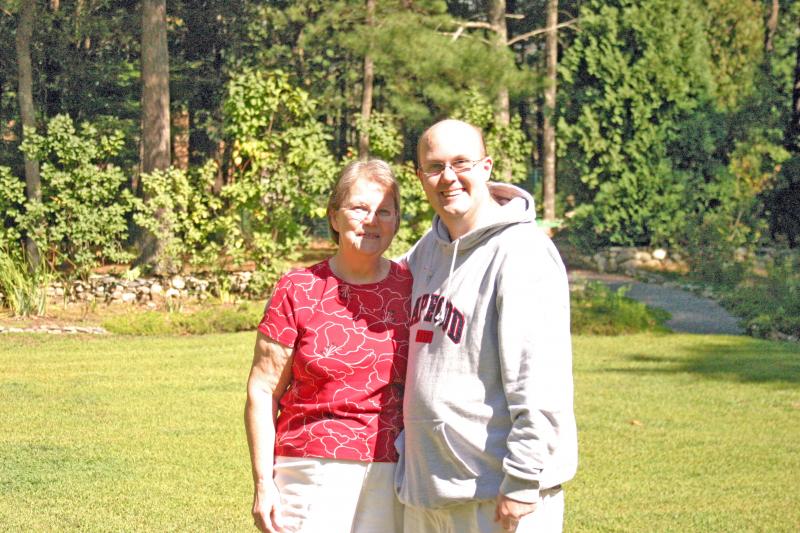Bringing support to Wareham caregivers
Donna Bonia didn't understand why she couldn't stop crying.
After 5 months of chemotherapy, 22 days of whole-head radiation and 5 days of site-specific radiation, her teenage son Rob appeared free from brain cancer. Doctors had given Rob a 10-percent likelihood of survival, but they had never before seen this type of cancer, Primary Central Nervous System Lymphoma, in a healthy 14-year-old. They said the more likely result of the cancer was one more month to live.
After the treatment, Donna felt extremely grateful and blessed. But she also felt like she was grieving.
"They had a 'celebration' at the end of the treatment. A 'yay, you can pick up your life again,'" said Bonia. "But I found myself crying."
And with each checkup that delivered more good news (Rob has been in remission for 17 years now) she only felt worse for having these thoughts. So she finally asked a social worker why she felt so sad.
"She said that the son I had going in to the treatment is not the son you have now," Bonia said. "I was mourning the loss of the first son."
While the treatment saved Rob's life, it also profoundly changed it. The treatment in combination with the cancer caused extreme frontal lobe damage and has limited Rob's ability to function.
"Rob sees himself as he was, but things have changed," Bonia said. "He went from being an honors student to being a special-needs student...He feels he can do anything, but sometimes because of occasional 'short circuits,' he can't do things like drive a car or live on his own without supervision."
And while Boston's hospitals could provide the best treatment, it wasn't feasible for Rob and his mom to go into the city for continuing support.
"I was frustrated for years," Bonia said. "There was just nothing in the area."
So Bonia decided that she had to find the services herself. Three years ago, she attended the Brain Injury Association of Massachusetts' Caregiver Conference and realized that many others in the area were looking for services as well. So she started a support group that meets in Wareham on the fourth Wednesday of the month. The first group was so successful, that she has started a second group, which meets once a month during the day.
"Sometimes it's just having somebody to vent to, just having a shoulder to cry on, or somebody able to talk to," said Bonia.
Bonia has also become a dedicated volunteer for the Brain Injury Association. She and her husband have both spoken at the annual Caregivers Conference, and she was a committee member for this year's conference on September 25 in Acushnet.
It is a natural evolution, as the group frequently discusses how to access services, which sometimes requires navigating through state bureaucracy.
The state offers many support and services for person with brain injury through its Statewide Head Injury Program (SHIP). However, most of their services are limited to those with a traumatic brain injury, which is by state definition caused by an "external blow to the head." Survivors like Rob, who may have had brain injury caused by a brain tumor, aneurysms, a stroke, or other internal factors, are ineligible for many state services and rely on the Brain Injury Association, which treats all survivors of brain injury.
Bonia said that she would like to see the diagnosis of head injury changed so that services are based on all survivors' needs rather than their diagnoses'.
"Many people at the state level are working on this issue to establish a more equitable system," said Sandy Toppalian at the Brain Injury Association of Massachusetts.
Other issues include finding housing for those with brain injuries who need frequent supervision and often have mobility problems, but who also want a measure of independence.
And of course, the group also has fun.
Rob said he loved the group's monthly outings, especially the summer cookouts on the beach. And there are lots of hugs at group, which he also likes.
For Donna Bonia, the best part is knowing that she can help people realize that they're not alone. She stresses the importance of caregivers taking care of themselves first. She has had health problems herself, and she recognizes how difficult it is for caregivers to concentrate so hard on providing for somebody else that they neglect their own needs. But in the long run, she stresses that caregivers are no good for their dependents if they are not around to take care of them.
The group is also a kind of fulfillment of Bonia's earlier dream to work in health care.
"I wanted to go into nursing or become a veterinarian, but I was lousy in chemistry," she said. But now "I'm exactly where I'm supposed to be at this time."
For more information on the Caregiver Conference, or to learn about support services for survivors, call the Brain Injury Association of Massachusetts at 508-743-0333. All services are free.













